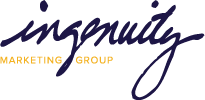
Podcasts have made a resurgence across generations. We listen to them on the way to work or doing the dishes. We pop them into our ears to drown out the sound of traffic on a walk. We’re learning something new every day – about accounting, marketing, and those podcasts that make us feel like crime scene investigators…
If you’re already deeply embedded in building your own podcast network, great! This edition of Great ThinkING will give you the highlights to reach your target audience.
If you haven’t started yet but want to jump in and build your personal or firm brand – read on!
Have you seen/heard our InGenius Podcast? Check out one of our favorite episodes!
Podcasting Best Practices
- Pick your top four podcast placements (e.g. Spotify, Apple?) before you get started (become familiar with what other podcasters are doing to make your podcast unique and well branded).
- Come up with a catchy, yet descriptive name for the podcast.
- Design your high resolution logo and cover banner for your podcast. Understand the parameters of a square logo so it looks good on the platforms.
- Plan a few podcast topics in advance and set time aside for recording and editing. You want to stick to a consistent schedule, so your fans know when new episodes are coming out.
- Use a good microphone!
- Be enthusiastic and conversational with your topic, so do your research and plan out your talking points ahead of time (post-production often takes more time than pre-production if you have a ton of edits – the fewer edits, the better!).
- A nice intro and outro with music or distinct sound go a long way toward creating a professional and fun impression.
- To brainstorm additional topics, look into trends and client emails to decide what to talk about. Are your clients asking the same questions about a certain QuickBooks feature or update? Make an episode about that so you can send others the link, which will save you time in the future.
- Do you want to bring on guests? If interviewing referral partners, make sure that you don’t overemphasize one vendor over another.
- Avoid making your topics salesy or self-promotional. Add valuable information to help your listeners.
Here’s an example of podcasting done right.
Bonus Tip: Promote your podcast and track your results. Podcasts are a lot of work, and they need to fit your marketing strategy and business goals. Otherwise, consider outsourcing your planning and production.
With a podcast, there is always room for improvement. The hardest part is getting started and being consistent with your podcast calendar.





